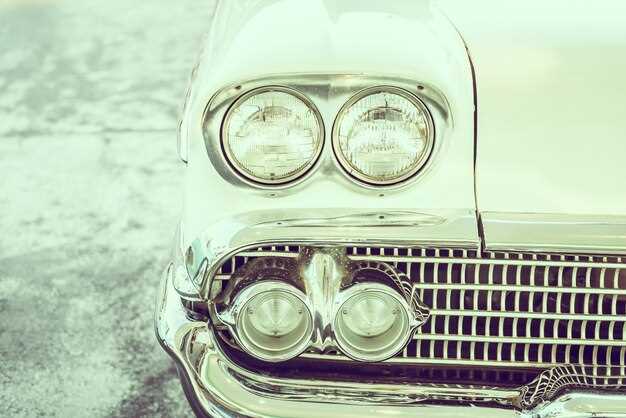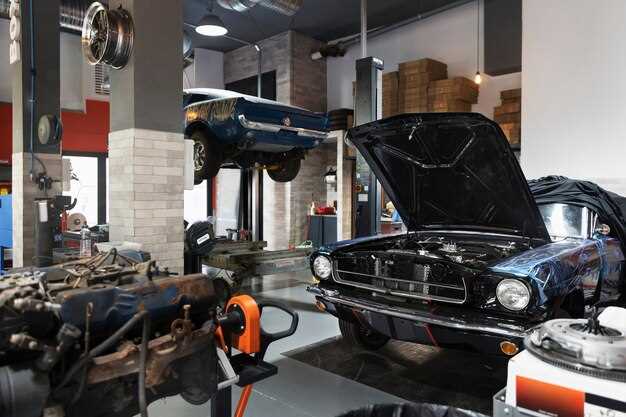
Restoring a classic car is not just a labor of love; it is an investment that can yield significant returns when done correctly. The market for restored classic cars has grown increasingly competitive, making it essential for sellers to employ effective strategies to attract potential buyers. Understanding the nuances of this niche market is crucial for a successful sale.
One of the primary strategies involves documenting the restoration process. Potential buyers appreciate knowing the history of the vehicle, as well as the efforts taken to restore it to its former glory. Providing detailed records, including photographs of the restoration stages and receipts for parts and labor, can significantly enhance the car’s perceived value.
Additionally, investing time in professional detailing can make a substantial difference in how a classic car is presented. A well-maintained vehicle that shines both inside and out is more likely to attract buyers’ attention. Highlighting unique features and modifications can further differentiate the car in a crowded marketplace.
Finally, selecting the right platform for selling is critical. Whether choosing online marketplaces, classic car auctions, or local car shows, ensuring that the chosen venue aligns with the potential buyer demographic will increase chances of a successful sale. Employing these strategies will better position sellers to achieve favorable outcomes in the classic car marketplace.
Optimizing Your Online Presence for Classic Car Sales

To successfully sell restored classic cars, establishing a robust online presence is essential. Start by creating a professional website that showcases your inventory. Include high-resolution images with detailed descriptions for each car, highlighting unique features and restoration details. A well-structured layout and easy navigation enhance user experience, encouraging potential buyers to explore your offerings.
Search engine optimization (SEO) is a critical aspect to consider. Incorporate relevant keywords related to classic cars and restoration in your content to improve visibility on search engines. Utilize local SEO strategies to attract buyers in your geographical area, which includes optimizing Google My Business listings and encouraging customer reviews.
Social media platforms serve as powerful tools for reaching a wider audience. Create accounts on platforms such as Instagram, Facebook, and YouTube to showcase your vehicles. Post engaging content regularly, including restoration projects, customer testimonials, and behind-the-scenes footage of your work process. Utilize targeted advertising to promote your posts and reach specific demographics interested in classic cars.
Online marketplaces and auction sites specifically for classic cars can be beneficial for reaching buyers actively seeking such vehicles. Create detailed listings on these platforms, ensuring to maintain a consistent brand image across all channels. Consider participating in online classic car forums and communities, where you can network with enthusiasts and showcase your expertise.
Lastly, consider incorporating an email marketing strategy. Collect email addresses from interested parties through your website and social media, then send newsletters featuring new arrivals, success stories, and tips related to classic car maintenance. This maintains engagement with potential buyers and encourages repeat visits to your site.
Building Trust Through Detailed Documentation and Transparency
In the classic car market, trust plays a crucial role in attracting potential buyers. A comprehensive approach to documentation and transparency can significantly enhance this trust. Start by compiling a detailed history of the vehicle, including previous ownership records, restoration processes, and any repairs made over the years. This history not only verifies authenticity but also showcases the car’s journey, which can be enticing to buyers.
Next, provide thorough documentation of the restoration process. Include receipts, timelines, and photographs that detail each stage of the project. For buyers, visual evidence of a meticulous restoration can instill confidence in the quality of workmanship and authenticity of the parts used. Make sure to outline the sources of parts and any upgrades that have been made, clearly distinguishing between original components and those that have been replaced.
Transparency extends beyond just documentation; it involves clear communication with potential buyers. Answer questions honestly and be upfront about any imperfections or issues that remain. A trustworthy seller acknowledges the car’s flaws rather than attempting to conceal them. This openness can foster a positive relationship with buyers, encouraging them to feel more secure in their purchasing decision.
Additionally, utilizing third-party evaluations or appraisals can bolster credibility. Having an independent expert validate the car’s condition and value can provide potential buyers with an added layer of assurance. This third-party endorsement serves as an objective confirmation of the car’s integrity, further building trust in your selling approach.
Lastly, maintain a robust online presence that showcases both the cars for sale and your past successful sales. Positive testimonials from previous buyers can significantly enhance your reputation and act as endorsements of your reliability. Collecting reviews and recommendations can create a solid foundation of trust that encourages new buyers to engage.
Targeting the Right Audience with Focused Marketing Techniques

Successfully selling restored classic cars requires not just a passion for automobiles, but also a well-thought-out marketing strategy that resonates with the right audience. Identifying and understanding potential buyers is crucial for effective outreach and communication.
Demographic Analysis is the first step in targeting the right audience. Consider factors such as age, income level, and geographic location. Classic car enthusiasts are often older individuals who have disposable income and a fondness for nostalgia. Conduct market research to gather data on buyer demographics, which can inform your marketing channels and messaging.
Utilizing Social Media Platforms helps in reaching your target audience effectively. Focus on platforms like Facebook, Instagram, and classic car forums where enthusiasts gather. Create engaging content that highlights the story behind each restored vehicle, showcasing its unique features and the craftsmanship involved. High-quality images and videos can significantly capture attention.
Community Engagement is vital for building relationships with potential buyers. Attend car shows, classic car auctions, and other automotive events. Networking at these events allows for direct interaction with potential customers, which can foster trust and lead to future sales. Distributing business cards and promotional materials at these venues can also be effective.
Content Marketing serves as a powerful tool to educate and attract buyers. Create informative blog posts or articles that discuss the restoration process, care tips for classic cars, and reviews of different makes and models. This content can position you as an authority in the field and draws enthusiasts to your website.
Email Marketing allows for direct communication with interested parties. Build a mailing list from your website and events to share exclusive offers, upcoming events, or newly available cars. Segment your audience based on their interests, ensuring tailored messages that speak directly to their preferences.
Creating a Sense of Community through online groups or forums can help in solidifying your presence among enthusiasts. Facilitate discussions and interactions about classic cars, not just your products. By positioning yourself as a part of the community rather than just a seller, you enhance your credibility and brand loyalty.
In summary, targeting the right audience for restored classic cars involves a blend of demographic analysis, strategic use of social media, community engagement, content marketing, and effective communication channels. By focusing your marketing techniques, you can increase your chances of connecting with passionate buyers and driving successful sales.

